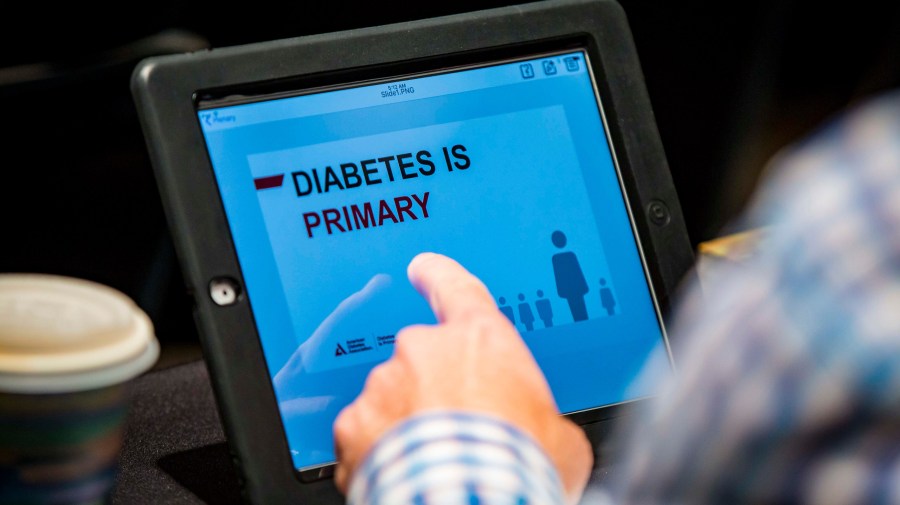How Long After a Blood Transfusion Will I Feel Normal Again

Medical terminology can be a fleck disruptive, even when the particular in question is something very basic, similar claret sugar. You've probably heard someone in your life talk near their blood sugar — besides known as blood glucose — before. In truth, blood sugar levels affect everyone, non just those with diabetes. Temporary rises and falls in blood saccharide tin crusade a host of problems, such as fatigue, weakness, nausea, airsickness, dizziness and headaches. Ongoing bug with blood sugar can lead to serious wellness conditions.
Learning about normal blood sugar levels is helpful for everyone and admittedly critical for those managing endocrine conditions like diabetes or hypoglycemia. If yous're non sure what "normal" should expect like, check out this guide to normal blood sugar levels and diabetes exam range numbers.
Normal Blood Sugar Levels
Normal blood sugar levels vary throughout the twenty-four hour period for everyone and are affected past the foods nosotros eat, the beverages nosotros drinkable and the practise (or lack of it) nosotros get. A normal blood sugar level for a person who has not been diagnosed with diabetes should be 80-99 mg/dL (milligrams per deciliter) when they take not eaten for more than two hours. This means there are lxxx-99 milligrams of glucose (a type of saccharide in the trunk) per deciliter of blood when the blood is tested.
When a person with normal blood sugar responses eats a repast, the claret carbohydrate will spike only should non exceed 140 mg/dL. The exact amount of the spike will vary based on the foods that are eaten. Approximately 2 hours afterwards eating a meal, normal blood carbohydrate should fall below the 140 mg/dL maximum in a person who does non take claret sugar issues. A person who has been diagnosed with diabetes or other endocrine weather condition will accept different blood sugar levels that crave close monitoring.
What Is Diabetes?
Diabetes is a disease that affects blood sugar management in the man body. If yous are diagnosed with diabetes, it means the amount of glucose or carbohydrate in your blood typically remains too loftier and exceeds blood sugar levels that are considered normal. This occurs when there is a problem with the insulin response in the body.
Insulin is created past the pancreas specifically to manage the level of glucose in the blood to ensure that sugar is transferred to the torso's cells to be used for energy. In a person who has been diagnosed with diabetes, the pancreas either doesn't make the insulin the body needs (Type one diabetes), or the trunk becomes resistant to insulin, causing regular insulin production to no longer be sufficient for controlling claret sugar (Type ii diabetes).
Types of Diabetes
Type ane diabetes occurs when the pancreas stops making insulin at all or makes very little. The reasons for this still aren't completely understood, although genetics are believed to play a role in many cases. Information technology'southward possible to develop Type i diabetes at any age, but it oft first appears in children or at a young age. If y'all develop this blazon, you will accept to take insulin every twenty-four hour period to ensure sugar doesn't build upward in your blood to a dangerous level. The blazon and frequency of insulin doses varies from person to person.
Type 2 diabetes most oft develops in eye-anile adults. The reasons the body develops a resistance to insulin in some people aren't fully known, but scientists have definitely linked diet and obesity to an increased gamble of Blazon two diabetes. Gestational diabetes is a grade of insulin resistance that occurs due to hormone changes in pregnancy. This type of diabetes usually disappears later on giving birth, but it has been linked to a greater risk of Type two diabetes in the future.
Monogenic diabetes and cystic fibrosis-related diabetes are ii additional forms of diabetes that don't receive as much attention. Monogenic diabetes is rare — about i% to 4% of cases — and normally inherited from ane or both parents. It occurs due to a single gene mutation. Cystic fibrosis-related diabetes only occurs in combination with cystic fibrosis, simply it affects about forty% to 50% of those who take CF and shortens their lifespans.
Testing for Diabetes
If you lot experience symptoms that indicate your blood sugar is high, your doctor may investigate by ordering a series of blood tests that include your claret glucose level at the time of the test besides as your glycated hemoglobin level. Also known as an A1C test, your glycated hemoglobin level provides information nigh your average blood sugar over a period of two to three months. If your A1C level is above 6.v%, it could indicate you have diabetes, especially if the results of a fasting blood carbohydrate test and an oral glucose tolerance test also signal diabetes.
Treating Diabetes
If you are diagnosed with whatsoever form of diabetes, handling begins with monitoring your claret saccharide levels carefully. Many people with Type 2 diabetes successfully manage their claret saccharide levels with salubrious dietary changes that minimize saccharide and carbohydrate consumption and the addition of exercise to their daily lives. In some cases, they besides have to take medication or rely on insulin replacement to manage their blood carbohydrate levels.
If you have Type i diabetes, insulin replacement therapy is required to control the blood sugar level in your body. Replacement therapies consist of doses of insulin delivered via injections or through an insulin pump. Oral medications may be used in combination with insulin therapy for better results, but insulin itself is not administered orally.
Resources Links:
https://world wide web.thediabetescouncil.com/what-are-blood-carbohydrate-target-ranges/
https://world wide web.mayoclinic.org/diseases-conditions/diabetes/symptoms-causes/syc-20371444
https://www.ncbi.nlm.nih.gov/pmc/articles/PMC5826202/
https://www.niddk.nih.gov/health-information/diabetes/overview/what-is-diabetes/monogenic-neonatal-mellitus-mody
https://www.mayoclinic.org/diseases-atmospheric condition/diabetes/diagnosis-treatment/drc-20371451
https://www.cdc.gov/diabetes/managing/manage-claret-sugar.html
Source: https://www.symptomfind.com/health/what-is-normal-blood-sugar-level?utm_content=params%3Ao%3D740013%26ad%3DdirN%26qo%3DserpIndex
Post a Comment for "How Long After a Blood Transfusion Will I Feel Normal Again"